Reclaiming Space for Women in Love Sonnets
How do young women take agency of their own storytelling? When sitting behind the table in a hierarchal rehearsal room is no longer enough, what could a more conversational and curious rehearsal process look like? This series will investigate these questions and expand on the process of creating Love Sonnets: Things Women Say, a staged reading developed under Emerson College's Mercutio Troupe.
As students at Emerson College, a school known for its theatre program, people might assume that finding space to do theatre would not be a problem to be solved, but alas it is. In the near past, our school changed locations and then built itself up again to fit the new amount of students. But now—once again—we find our program growing before our school has the capacity to handle our needs, so a demand for space is always on the brain.
To find a rehearsal location, you learn quickly how to strategize. Students book rooms though an online program that is better than sleeping in the studio lobby, which I did my freshman year to book studios in-person. At exactly 12:00:01 AM, the game to get a studio is in full speed. Usually at 11:45 PM, the director of a project seeking rehearsal space will send a reminder to the production team Facebook group chat to see who can be on booking duty and give the details of studio preference and time. There’s an amount of inherited knowledge to spread to younger students in the department: introducing all the ways to cut corners when filling out forms to reserve space and of course, the Big Kahuna—changing the time on your computer from hour: minutes to hour: minutes: seconds. It’s the ticking down of the seconds, anticipating the nanoseconds, that takes the amateurs to the big leagues.
Not only was the cast grappling with finding the language of intersectional feminism, but Caitlin and I were also learning how to navigate this conversation with other young women.
Physical Space
Usually the Associate Director does not book space, but this project was not occupying the typical structures. I gladly helped out in any way because this production was more fluid to suit feminine leadership style. To my dismay, even after my online reservation crash course with the younger generation, we ended up in classrooms for the majority of the rehearsal process. Upon reflection, this made a lot of sense for our work. Caitlin Bailey, the director of Love Sonnets: Things Women Say, created this project as an examination, not a production. The impetus for this staged reading was to probe how feminist theory can inform a text, not how the text informs the theory. It recalled Anne Bogart’s breakdown of linguistics in A Director Prepares. The German word for rehearsal means “to investigate,” while the English word means “a repeating.” After going through the rat race of study reservations, it became obvious that a classroom parallels the work we set out to do: to learn how to build authentic women’s voices onstage, while still acknowledging that some of that space is occupied by men.
Through this process we were going to learn, so why not let the rehearsal room be within a classroom? Caitlin and I led discussions in rehearsal about feminism through the words of a male-identifying playwright with mostly freshman and sophomore students. Not only was the cast grappling with finding the language of intersectional feminism, but Caitlin and I were also learning how to navigate this conversation with other young women.
Woman Space
This brings me to the idea of female spaces. I think about my first investigation of me not taking up space. I think about female-identifying women taking up space in the world. I think of female spaces in theatre. Ladies writing theatre. Ladies directing theatre. Ladies talking about ladies. Ladies advocating for other ladies. Ladies advocating for themselves. Ladies loving ladies. Ladies loving ladies. Ladies loving men.
My time in college has been an eye-opening experience into the complexities of historical constructs and belief systems that secure patriarchal values in our society. During high school, I wouldn’t have considered myself a feminist. Some guys would tell me I was and make it sound like a bad word; so I didn’t identify with the word because it felt shameful. During my first year of college, it was like a crash course in the micro- and macro- ways society has oppressed me and my sisters. Crazy things started to appear. My life went from black-and-white to technicolored.
I have been fortunate since to be in rooms that are sometimes intentionally, and sometimes unintentionally filled with only women. Love Sonnets was a situation where we were intentionally coming together to talk about women, feminism, intersectionality, and (last but not least) men. I think one of the most challenging things about being in a rehearsal room filled with women is finding space for men. Within the pre-written text of Love Sonnets, Chuck Mee writes of women loving themselves, loving love, loving men, and hating men. Within our ensemble, the following questions were asked: Where’s the queer love? What about trans voices within this text? What if people think we hate men? Will men come to this? As the associate, I was able to be side by side with Caitlin as we navigated her gender studies background with my theatre education knowledge to try and find thoughtful forwarding responses that did not shut down our ensemble but inspire future curiosity. And the answers circled around: there is just so much womanhood to cover, we need to focus on the voices we have in the room, and recognize that this cannot always be all-encompassing. We hope many more women will be inspired to follow up and investigate areas we were not able to explore in-depth in their own projects!
Our investigation of feminism through the foundational writing of a male playwright brought up one last basic question: Why not a female playwright? But with an all-female cast and production team, Caitlin and I felt it important to discuss how to be allies with men. Men will always be there and they will always write women into their literature (or so we hope!), so let’s give them space on our watch. Let’s pick apart the words, let’s hold those words, and perform those words the way we want. To talk about the female experience (in all contexts, queer and otherwise) without men develops deeper toxic masculinity. If men don’t have space to learn, how will they ever have the capacity to be allies?
Through the cast, dramaturgs, and director talking about Charles Mee’s work—through all of us shaping the rhythms, the order of the monologues, and developing the shape the text physically occupied in the space—we had a conversation with the male playwright. We took control of our narrative within the foundational text.
The Final Space
In the midst of leading conversations about feminism, of examining masculinity and womanhood’s answer to that, of figuring out the arc of the script—we still hadn't found a physical home for the performance of our staged reading. We had been actively seeking but still were having no luck. Then, the availability of the Huret and Spector Art Gallery fell into our laps. So just like that, Love Sonnets was performed in the small art gallery on campus.
It became the imperfect place and the perfect place to do our reading. It may have not been the ideal space, but it was the space that made sense. The classroom reflected the process and this art gallery reflected the structure of the performance—a bunch of moments tied together through the development of a curator, suggesting but not demanding experiences of its audience. During the performance, seats were piled into the space, but unlike most conventional theatrical performances, people could easily sit on the floor, move their chairs, and crane their necks for the access to the performance they desired.
Below is a poem by Mary Frances Noser, one of the actresses in the ensemble, that was included in our performance. I think this piece best encapsulates a feeling about the physical territory we made for ourselves through this piece of theatre:
She is human.
She is Herself.Do not put her in dresses
or skirts
or pants
or zippers
or buttons
or blankets
or countries
or boxes.She is Herself.
She owes you nothing.
She deserves everything.She can be anything.

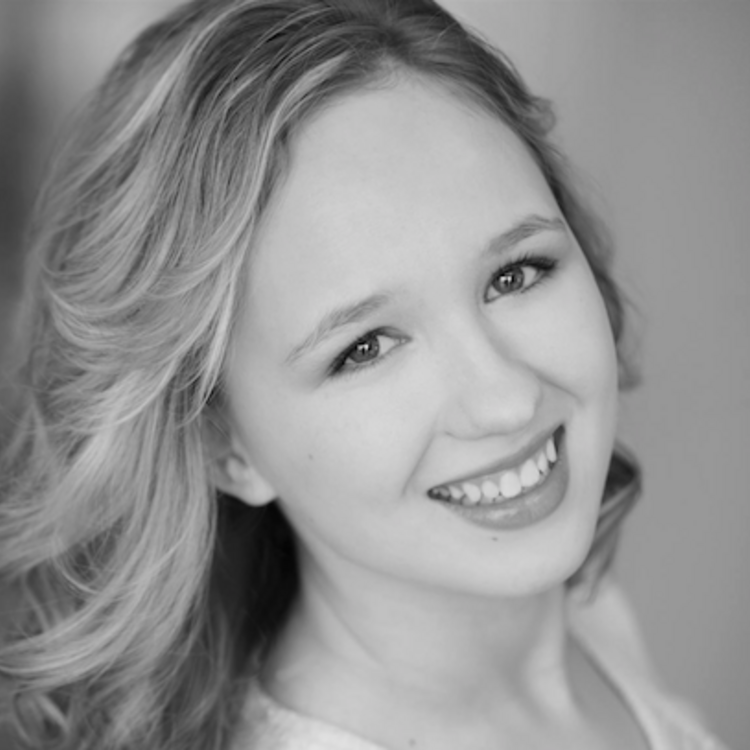
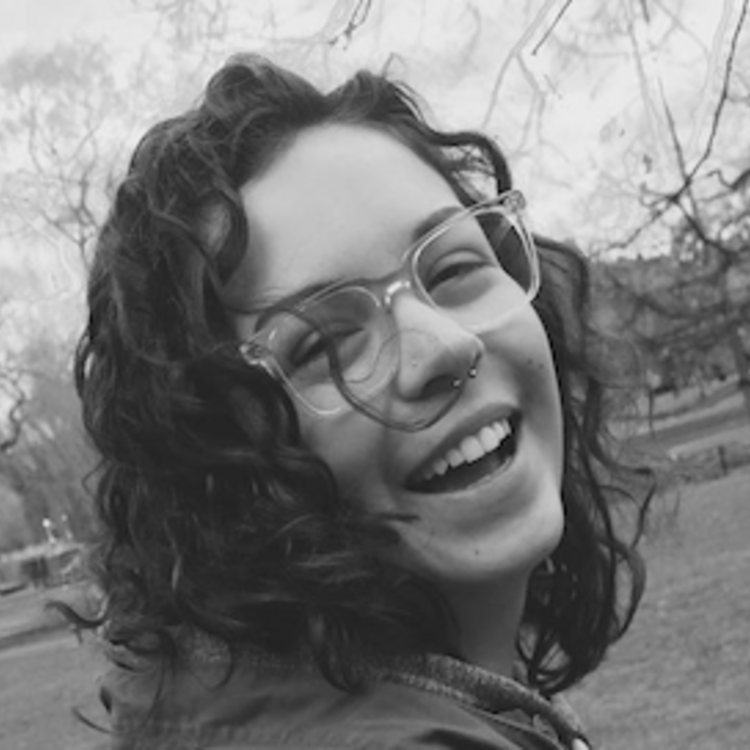
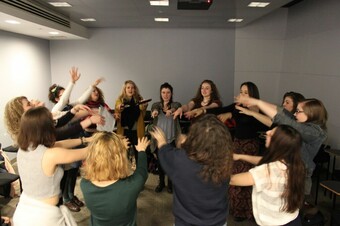

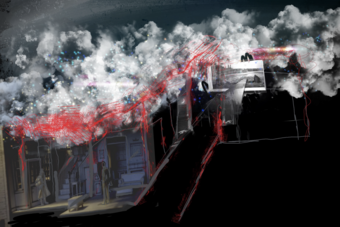


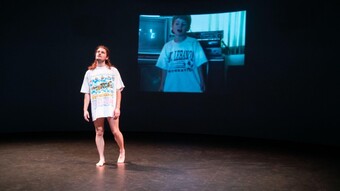



Comments
The article is just the start of the conversation—we want to know what you think about this subject, too! HowlRound is a space for knowledge-sharing, and we welcome spirited, thoughtful, and on-topic dialogue. Find our full comments policy here